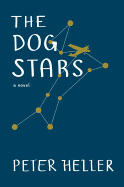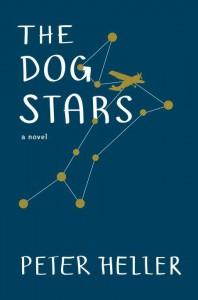
 With echoes of Moby Dick, Peter Heller's terrific first novel, The Dog Stars, wastes no time introducing everything we need to know about his narrator: "I keep the Beast running. I keep the 100 low lead on tap. I foresee attacks. I am young enough. I am old enough. I used to love to fish for trout more than almost anything. My name is Hig, one name. Big Hig if you need another."
With echoes of Moby Dick, Peter Heller's terrific first novel, The Dog Stars, wastes no time introducing everything we need to know about his narrator: "I keep the Beast running. I keep the 100 low lead on tap. I foresee attacks. I am young enough. I am old enough. I used to love to fish for trout more than almost anything. My name is Hig, one name. Big Hig if you need another."
Hig sleeps under the stars alongside the tiny Erie, Colo., airstrip nestled in the crumbling ruins of a suburban development of vacant McMansions. Except for his wily, gun-toting, self-preservationist partner, Bangley, and his last-legs dog, Jasper, Hig is alone. "The flu killed almost everybody," he explains, "then the blood disease killed more. The ones who are left are mostly Not Nice, why we live here on the plain, why I patrol every day." While Bangley gathers his protective arsenal, Hig secures a 1950s Cessna (nicknamed "The Beast") and fuel to reconnoiter their "perimeter" from the air.
Heller's survivors are a symbiotic yin and yang pair: Bangley's motto is "Guilty until--until nothing. Shoot first ask later. Guilty then dead," while Hig is willing to "let a visitor live a minute longer until they prove themselves to be human... because they always do." Like Didi and Gogo in Beckett's Waiting for Godot, the two men are lonely survivors in a post-apocalyptic world waiting for whatever comes next, a time and place where hunting, fishing, and farming (and flying and killing) are the only skills that matter.
These references to Melville and Beckett are not inappropriate. Heller brings Melville's broad, contemplative exploration of good and evil to his story; he tells it in the spare, often disjunctive, language of Beckett. Heller's vision, however, is not as dark as that of his literary antecedents. His faith in the resilience of mankind is reflected in Hig's persistence in fishing for river carp in the face of the extinction of his beloved trout. "They fought without the vigor of a trout but with a sullen reluctance like a mule digging in his heels," Heller writes. "They simply refused to budge which wasn't fun, but then there wasn't much fun anymore and I came to admire their stoicism. A stolid refusal to be yet consumed by the universe." Perhaps we, too, will be up to the task when Armageddon comes. --Bruce Jacobs
Shelf Talker: With startling lyricism, Peter Heller's accomplished first novel rises above the inherent darkness of a world stripped bare by disease, climate change and violence.

